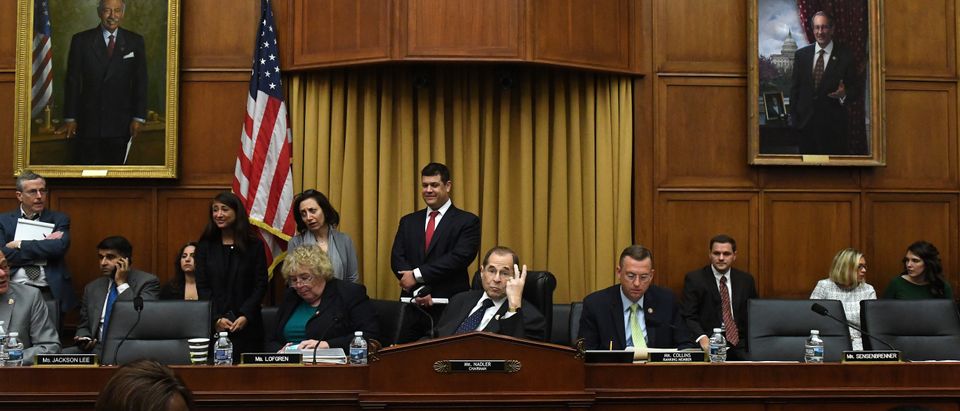Although the full House will return to D.C. on Sept. 9, the House Judiciary Committee will return a few days early to deal with gun control. In the aftermath of the mass killings in El Paso, Texas, Gilroy, California, and Dayton, Ohio, there is renewed urgency to “do something.”
But the focus should be on policy that will actually reduce the incidence of gun violence, not just sound good. Doing something for the sake of doing something is never good policy.
On Sept. 4, there will be mark-ups presented and hearings conducted on three new gun control bills:
- The “Keep Americans Safe Act,” which would ban any ammunition magazines over 10 rounds.
- The “Extreme Risk Protection Orders Act of 2019,” which would remove access to firearms from people who are deemed to be a danger to themselves or others.
- The “Disarm Hate Act,” which would prevent someone convicted of a misdemeanor hate crime from obtaining a firearm.
The committee is also slated to take up a hearing on “military style assault weapons” later in the month.
House Judiciary Committee Chairman Jerrold Nadler (D-N.Y.) called these bills “violence prevention bills.” We all want to keep people safe, but does evidence exist that any of these proposals would actually reduce gun violence?
First, do reductions in magazine capacity equate to a reduction in homicides? A 2015 study by William and Mary College that examined data between 1993 and 2013 “could find no evidence that large capacity magazines (LCM) increased either murder or gun murder, implying that the federal LCM ban did not have the intended effect and the LCM bans are likely to be ineffective.” Shouldn’t Nadler take this in to consideration?
Second, extreme risk protection orders (ERPOs), also referred to as “red flag” bills, are making their way across state legislatures, and there are as many versions as there are states. The devil of bills is always in the details, and there is wide variation in ERPO laws. One of the areas of disagreement from civil libertarians is whether there is due process in these bills, and what opportunities exist for the laws to be misused.
This ERPO bill allows for the petitioner to meet with a judge without the gun owner involved, to request firearms be removed. The person who is the subject of the ERPO can have a hearing to respond in 30 days. What if the petitioner has ill intent, and wants to disarm his ex for 30 days, so that he can harm her? And in the case of a truly violent person, removing a firearm from the house, and leaving other weapons (knives, rope, hammer, car, etc.) isn’t solving the problem. Deal with the dangerous person, not a specific tool.
Third, the “Disarm Hate Act” elevates some misdemeanors to such a level that some people could be prevented from ever legally owning a firearm for relatively minor acts. While the Act may sound good on a superficial level, this is a dangerous slippery slope. First, it is important to remember that however horrific the views are of racists, anti-Semites, homophobes, and others who hold appalling views may be, it is impossible to legislate thought. Furthermore, there may be broad agreement today on what constitutes “hate,” but what if tomorrow it is a pro-life activist, a member of a pro-Second Amendment organization, or those in favor of a more limited government? The ACLU took issue with such abuse in Pennsylvania, contending that the Commonwealth was abusing hate crime law to punish speech it didn’t like.
Finally, will banning “military style assault weapons?” reduce crime? Violence using firearms of all types was already on the way down when the 1994 “assault weapon ban” was passed. According to a study funded by the Department of Justice, “We cannot clearly credit the ban with any of the nation’s recent drop in gun violence.”
With an estimated 16 million AR-15 style rifles in the hands of law-abiding citizens, what good would this ban do today?
Congressman Peter King (R-N.Y.) signed on to the bill, proclaiming the need to get rid of “weapons of mass slaughter.” If saving lives is important, then maybe there should be a ban on knives, which the FBI found are used nearly five times more that rifles in murders.
We are all horrified by mass killings, as well as the daily body count in cities such as Chicago. However, in dealing with gun violence, Congress should focus on what has been shown to work, not simply what sounds good.
Laura Carno is a visiting fellow with the Independent Women’s Forum, a nonprofit group focused on engaging and informing women.
The views and opinions expressed in this commentary are those of the author and do not reflect the official position of The Daily Caller.



